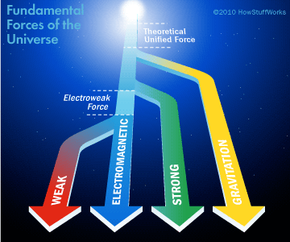Physicists smash particle beams together at the Large Hadron Collider (LHC), the world's largest and most powerful particle accelerator, and on July 4, 2012, they announced that these experience had gotten some impressive results. The researchers had found a particle that acts very like the Higgs boson should.
This leads to an inevitable question: Does the particle even exist?
Advertisement
This finding is one step to backing up the standard model of particle physics, which predicts that the Higgs boson is real. This theoretical model of the universe encompasses elements from both Einstein's theory of special relativity and quantum theory. It attempts nothing less than to define and explain the particles that make up all matter in our universe. While the standard model manages to explain much of the observable phenomena in the world around us, it also predicts things we haven't yet found for sure -- such as the Higgs boson particle.
In fact, the standard model doesn't merely predict the existence of the Higgs boson; it requires it. The theory proposes that electricity, magnetism, light and some types of radioactivity are all manifestations of a single underlying force called the electroweak force. It unites the electromagnetic and weak forces, two of the four fundamental forces of nature, along with the strong force and gravity. But the theory only holds water if the particles in question had no mass in the period immediately following the big bang.
That's where the elusive Higgs boson comes into play; with its large mass and nonexistent spin, it's thought to generate a Higgs field that imbues all the particles that pass through it with mass. Particle physicists believe this field exists throughout the universe, but they also believe that it's incredibly unstable. It falls apart moments after its creation, leaving behind only products from its decay to prove that it ever existed.
Finding the Higgs boson could provide an explanation of why matter has mass and flesh out several cosmic mysteries. Still, some researchers equate the quest for the Higgs with Christopher Columbus' famous 1492 voyage. The Spanish explorer set sail for the East Indies, landed in what he thought was Asia and actually discovered the Bahamas. While particle physicists hope to discover the Higgs, it's entirely possible that the quest will lead them to some other explanation for the standard model. Conversely, the Higgs might prove to be just one part of an even more complicated situation. Scientific inquiries, after all, often lead to even more scientific quandaries.
In the days following the 2012 announcement from scientists at CERN, researchers continued to be cautious. Tests have to continue, and the data has to hold up to scrutiny. For now, some scientists have struck a compromise, calling the particle "Higgslike."
Explore the links on the next page to learn even more about particle physics and the Higgs boson.
Advertisement


